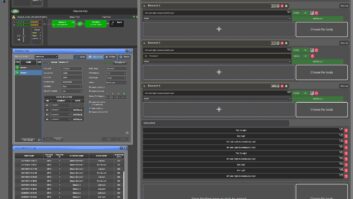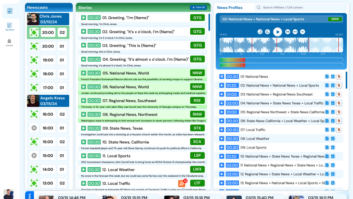Waitt Radio Networks tries out a new approach
When you think of satellite-delivered music formats, you probably think of names like ABC Radio Networks and Jones Radio Network. Out in the middle of the country, Waitt Radio Networks is trying to claim its piece of the market with a unique new system that combines the best aspects of voicetracking and satellite delivery to make stations sound live and local, even when there’s nobody home.
The Omaha-based company owns about 70 radio stations in the Midwest and provides five 24-hour formats to about 50 client stations from Maine to Hawaii. Four of the services, “Country Today, “Country Classics,” “Alternative Now” and “AC Active,” are traditional satellite-delivered formats, with a handful of breaks each hour for local IDs and weather inserts. The fifth, “Oldies Plus,” is localized for each market, with voice-tracked breaks delivered over the Internet.
IP at work
“Right now, we’re just like any other network, where if it’s a 3:30 network break, the affiliates will have to take 3 minutes and 30 seconds for the break,” said Skeet Skaalen, director of engineering for Waitt Radio Networks.
Within a few months, though, Waitt will roll out a delivery mechanism to its affiliates: IP-over-satellite, providing a customized, near-real-time program feed for each station.
“It’ll be our own Internet in the sky,” Skaalen said, combining the advantages of voicetracking and hard-drive automation with the reliable program delivery of satellite distribution.
The delivery system will use space on SAS Americom’s AMC-8 (formerly GE-8) C-band satellite, with affiliate stations providing their own dishes to connect to receivers and automation computers leased from Waitt.
What stations will receive from the system, Skaalen says, is a product that works just like traditional 24/7 formats but doesn’t sound like them on the air.
“That’s the biggest selling point – it sounds completely local,” he said. “The stations send us information daily by fax about what’s going on in their area.”
Mutually in Omaha
The DJs for each format will then use that information to create customized breaks for each station, which will be fed over the satellite IP station as MPEG files and played out by the proprietary automation software in each station’s PC. Waitt is working with software developer Macromedia to create that system.
Talent for each format will remain based at Waitt’s Omaha headquarters.
“At this end, they do quite a bit of tracking,” Skaalen said. “Basically, they’re working just ahead of real-time.”
The system will give stations plenty of flexibility once it’s in place. Skaalen says stations can treat it like a traditional 24/7 format provider if they want to, connecting it to their own existing automation systems to play out local spots, promos and inserts. They can also use Waitt’s automation software to handle their local production and automation needs, including live-assist for local dayparts.
“One of the big benefits, because a lot of it (the programming) is on the hard drive but close to real-time, is that stations can rejoin the network at any time,” Skaalen said. “If the (local) morning show ends at 10:03, for instance, they can just start the next event from the hard drive and our programming will pick up from there.”
Stations will also have the flexibility to alter timing of stopsets, something the traditional satellite format providers can’t offer. Because the program elements are being played out from a local hard drive instead of a distant studio, Skaalen notes, stations can lengthen or shorten breaks and drop songs as needed.
Waitt will begin rolling out the system toward the end of the first quarter or early in the second quarter of 2003. Once it’s in place, Skaalen says, there are plans to add at least one more format to the company’s offerings as Waitt grows into a more formidable challenger to the established satellite program providers.
Depending on market size, Waitt offers its program services as either barter or a combination of barter and cash.












